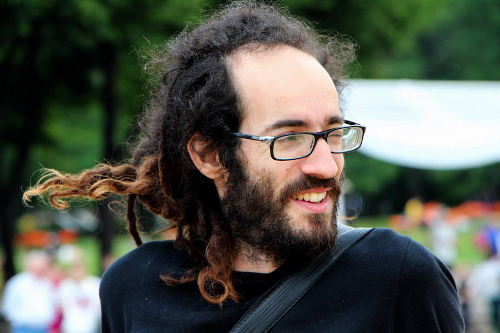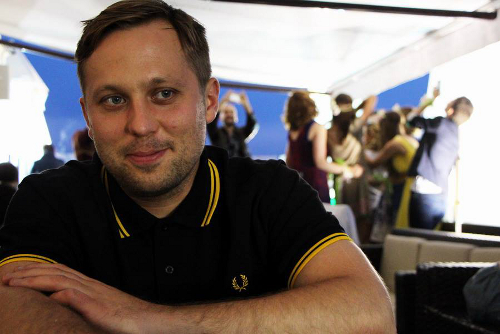Feedback

Andrea Brighenti:
"Taking part in the “Street Art in the Changing City: Theoretical Perspectives” conference in Moscow (June 7–8, 2013) has been an extremely rewarding experience.
"Taking part in the “Street Art in the Changing City: Theoretical Perspectives” conference in Moscow (June 7–8, 2013) has been an extremely rewarding experience.
First of all, the atmosphere of the meeting was warm, friendly and non-competitive. In my view, this is an essential condition for a scientific meeting to be really focused and productive, as “Street Art in the Changing City” turned out to be. This also happens when a conference is set up by a cohesive scientific group of people who are well brought together and who are personally committed to enhanced teamwork. In this case, organization is not a rigid structure which people have to serve, but a resource to better people’s work. Of course, small to mid-size conferences are facilitated in this task (on the contrary, it is awful when organization comes to matter more than the people who are there).
Second, I found the level of presentations well above the average (and consider that in the last couple of years I have been travelling a lot to conferences). Given that the number of topics and perspectives that have been touched upon is really considerable, particularly appreciated on my part has been that the relation between empirical research and theoretical reflection on analytical concepts has always consistently been present in the speakers’ presentations. This has facilitated the task of putting order in the wealth of cases and examples; also, the possibility of working comparatively through key analytical notions is extremely helpful and beneficial to all participants. This does not mean dogmatism or subscription to a single theory, rather, availability to articulate different phenomena by paying attention at the stakes and underlying dynamics that are entailed.
A third noticeable factor in the “Street Art in the Changing City” Moscow conference is that discussion has been extremely lively: in two full days there was never a single moment when the silence of boredom or embarrassment fell in the room. There were different voices contributing to the discussion, which means debate has not been hijacked by any single participant (contrary to what not rarely yet sadly I have noticed to happen in other contexts). Having spent time together after the conference has turned into a further venue to discussion and exchange of views. The kindness of the organizers has been, form this point of view, outstanding, as it is certainly not easy for foreigners to navigate a city like Moscow. So the conference hosts and organizers have done a remarkable effort of which I am deeply grateful.
Looking into the future, I think the conference could provide a blueprint for other future meetings on similar topics. Perhaps, the “On Walls” informal scholarly network could also be mobilized. There are a number of young and active scholars across different disciplines that are engaging the study of the urban visual ecology, urban visibilities, graffiti, street art and cultural production, who could be fruitfully brought into the discussion. Disciplines such as sociology, anthropology, human geography, criminology, urban planning, architecture, art history, economics, and law, could all provide important contributions to the study of how urban visualscapes change. Hopefuly, “Street Art in the Changing City” has been an excellent kick starter!"

Luke Dickens:
"The ‘Graffiti and street art in cultural cityscape’ conference was a great opportunity for me to present my research to a dedicated research cluster concerned the practices of graffiti and street art. It is unusual for an academic group to undertake such a sustained focus in this important but under researched topic, and coming together for two days to share and discuss our research was a really valuable experience. I was deeply impressed with the ways the ‘Contemporary Urban Culture’ Research Group comprised of scholars working across such a dynamic range of approaches and interests, across political, historical, sociological and anthropological readings, and with such diverse examples and cases from within Russia and internationally. The conference itself was well run and the topics covered were well-curated across the sessions, while the delegate group offered both depth and intimacy in the exchange of research findings and practices. I feel like I gained much from attending, and that I have forged a number of important research contacts and relationships that will last well beyond the conference itself. I’m very much looking forward to the longer-term outcomes of this conference in the coming year!"

Luke Dickens:
"The ‘Graffiti and street art in cultural cityscape’ conference was a great opportunity for me to present my research to a dedicated research cluster concerned the practices of graffiti and street art. It is unusual for an academic group to undertake such a sustained focus in this important but under researched topic, and coming together for two days to share and discuss our research was a really valuable experience. I was deeply impressed with the ways the ‘Contemporary Urban Culture’ Research Group comprised of scholars working across such a dynamic range of approaches and interests, across political, historical, sociological and anthropological readings, and with such diverse examples and cases from within Russia and internationally. The conference itself was well run and the topics covered were well-curated across the sessions, while the delegate group offered both depth and intimacy in the exchange of research findings and practices. I feel like I gained much from attending, and that I have forged a number of important research contacts and relationships that will last well beyond the conference itself. I’m very much looking forward to the longer-term outcomes of this conference in the coming year!"